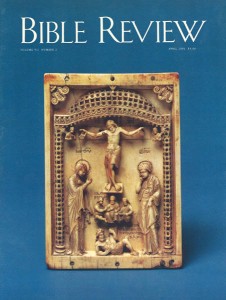Tracking The Law in The Mishnah and in a Qumran Text
Sidebar to: The People of The Dead Sea Scrolls
In arguing that the Qumran sectarians were Sadducees, at least in their origins, Lawrence Schiffman relies on a comparison of four laws discussed both in a Qumran sectarian documents known as MMT and in a rabbinic text from about 200 C.E. called the Mishnah. The passage in the Mishnah (Yadayim 4.6–7) records a dispute between the Pharisees and the Sadducees regarding the law on four rather obscure points. According to Schiffman, MMT defends the views that are ascribed to the Sadducees in the Mishnah.
The passage from the Mishnah reads as follows:
“The Sadducees say, We cry out against you, O you Pharisees, for you say, ‘The Holy Scriptures render the hands unclean,’ [and] ‘The writings of Hamiram [Homer?] do not render the hands unclean.’
“Rabban Yohanan b.a Zakkai [himself a Pharisee] said [perhaps mockingly], ‘Have we nothing else against the Pharisees except this? For lo, [the Pharisees] say, The bones of an ass are [ritually] clean [so cooking implements can be made from them], and the bones of Yohanan the High Priest are unclean.’
“They [the Pharisees] said to him, ‘As is our love for them so is their [the bones’] uncleanness [they cannot be made into cooking implements]—that no man may make spoons of the bones of his father or mother.’
“He [Yohanan] said to them [the Sadducees], ‘Even so the Holy Scriptures: as is our love for them so is their uncleanness; [whereas] the writings of Hamiram which are held in no account do not render the hands unclean.’
Already a library member? Log in here.
Institution user? Log in with your IP address.

